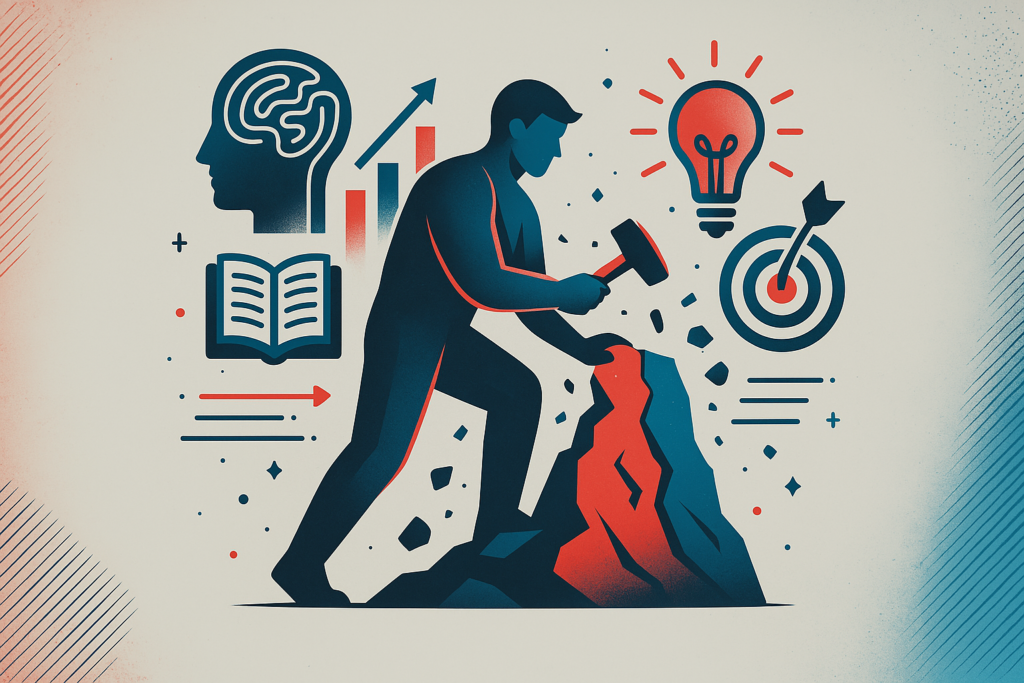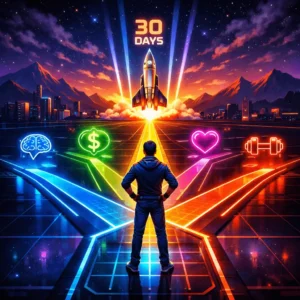Working on yourself is one of the most rewarding journeys you can undertake. It’s about consciously becoming the person you aspire to be while addressing weaknesses and building on strengths. Let’s explore practical approaches to meaningful personal development.
Understanding What It Means to Work on Yourself
Working on yourself isn’t about becoming someone different—it’s about becoming the best version of who you already are. This process begins with self-awareness: honestly assessing your current state, including strengths, weaknesses, values, and goals.
The most effective ways to work on yourself combine both behavioral changes and mindset shifts. When you align your actions with your core values, you create meaningful transformation rather than temporary fixes.
Read More: How to Find Yourself When You are Lost
The Growth vs. Fixed Mindset
At the heart of personal development is your mindset—how you view challenges, learning, and your own potential. People with a fixed mindset believe their qualities are carved in stone, while those with a growth mindset see themselves as constantly evolving through effort and learning.
When working on yourself, developing a growth mindset allows you to:
- View failures as valuable learning opportunities rather than reflections of your worth
- See challenges as exciting rather than threatening
- Persist through obstacles instead of giving up when things get difficult
- Learn from criticism instead of ignoring feedback
Read More: Abundance vs Scarcity Mindset
How to Work on Yourself: Practical Strategies
Develop a Growth Mindset
The foundation of working on yourself is adopting a growth mindset—believing your abilities can be developed through dedication and hard work. When facing challenges, train yourself to think “I can learn this” rather than “I can’t do this.”
Things to work on yourself in this area include:
- Viewing failures as valuable learning opportunities
- Celebrating progress instead of demanding perfection
- Actively seeking feedback and using criticism constructively
- Challenging negative self-talk with realistic alternatives
Related Article: Growth Mindset Activities for Kids
Building Healthy Habits
Habits form the backbone of lasting personal development. Working on yourself effectively means establishing routines that automatically move you toward your goals.
Ways to work on yourself through habit formation:
- Start extremely small—focus on consistency over intensity
- Stack new habits onto existing routines (e.g., meditation after brushing teeth)
- Track your habits visually to maintain motivation
- Design your environment to make good habits easier
- Identify and modify habit triggers for unwanted behaviors
- Practice habit bundling—pairing something you need to do with something you enjoy
- Understand that missing once is an accident, missing twice is the start of a new habit
The key to habit formation is patience and consistency. Research shows it takes anywhere from 18 to 254 days to form a new habit, with an average of 66 days for automatic behavior.
Read More: Gratitude Group Activities
Time Management
Mastering time management is essential when working on yourself. How you spend your hours ultimately determines your growth trajectory.
Effective time management strategies to work on yourself include:
- Conducting a time audit to understand where your hours actually go
- Prioritizing tasks using methods like the Eisenhower Matrix (urgent/important)
- Implementing time blocking for focused work on important but non-urgent growth activities
- Setting clear boundaries around digital distractions
- Learning to say “no” to commitments that don’t align with your priorities
- Using the “eat the frog” technique—tackling your most challenging task first
- Applying the Pomodoro Technique (25 minutes of focused work, 5-minute break)
- Building buffer time between activities to reduce stress and allow reflection
- Scheduling regular reviews to assess how effectively you’re using your time
Remember that the goal isn’t to fill every minute with productivity, but to intentionally allocate time to what matters most. Some of the most valuable ways to work on yourself—like reflection, deep thinking, or creative exploration—might look unproductive on the surface.
Mindfulness and Mental Health
Cultivating mindfulness is a powerful way to work on yourself from the inside out. Mindfulness—the practice of being fully present and engaged in the current moment—helps you respond thoughtfully rather than react automatically to life’s challenges.
How do I work on myself through mindfulness?
- Begin with brief daily meditation sessions (even 5 minutes helps)
- Practice bringing full attention to routine activities like eating or walking
- Implement regular mental health check-ins to assess your emotional state
- Learn to recognize thought patterns that don’t serve you
- Create a “worry time” to contain anxious thoughts instead of letting them dominate your day
- Develop a gratitude practice to shift focus from what’s lacking to what’s present
- Consider therapy or counseling for professional guidance and perspective
Mental health maintenance isn’t separate from working on yourself—it’s central to it. Just as you wouldn’t ignore physical pain, learn to address emotional distress with compassion and appropriate resources.
Prioritize Physical Wellbeing
Your physical health provides the energy and foundation needed for all other aspects of self-improvement.
For physical wellbeing:
- Find exercise you genuinely enjoy, making it sustainable
- Develop nutritious eating habits that work for your body
- Establish a consistent sleep routine with proper wind-down time
- Schedule regular health check-ups and preventative care
When you work on yourself physically, I create the energy needed to tackle other growth areas.
Read More: What Are the Top Five Things That Make You Happy in Life
Build Emotional Intelligence
Emotional intelligence—understanding and managing your emotions while navigating social interactions—is crucial for personal and professional success.
Ways to work on yourself emotionally include:
- Keeping an emotions journal to identify patterns and triggers
- Practicing the pause between feeling and reacting
- Developing healthy coping mechanisms for difficult emotions
- Improving active listening skills in conversations
- Regularly checking in with yourself about how you’re feeling
Cultivate Meaningful Relationships
Our connections with others profoundly impact our growth. How do I work on myself socially? By:
- Learning to communicate more openly and honestly
- Practicing vulnerability with trusted individuals
- Setting and maintaining healthy boundaries
- Addressing conflict constructively rather than avoiding it
- Being intentional about spending time with people who inspire growth
Our social growth is an ongoing journey that requires patience and consistent effort. The most meaningful connections often come when we balance authenticity with thoughtfulness. As you implement these practices, remember that discomfort is often a sign of growth. Each interaction becomes an opportunity to learn about yourself and others, creating a positive cycle of personal development and deeper relationships.
Read More: Signs You’re Healing from a Toxic Relationship
Pursue Continuous Learning
Intellectual growth keeps you adaptable and engaged with the world. You need to step out of your comfort zone and pursue learning new stuff. Things to work on yourself intellectually include:
- Reading diverse materials that challenge your perspectives
- Taking courses in areas of personal or professional interest
- Learning practical skills that enhance your independence
- Exposing yourself to different cultures and viewpoints
- Engaging in thought-provoking discussions
Intellectual growth also thrives when balanced with curiosity and persistence. The journey isn’t just about accumulating facts but developing a flexible mindset that can adapt to new challenges. Remember that meaningful learning often occurs at the edges of discomfort, where established patterns of thinking are disrupted. By consistently nurturing your intellectual development, you build not just knowledge but wisdom—the ability to apply understanding in ways that enrich both your life and potentially the lives of others.
Practice Self-Compassion
Many people approach working on themselves with harsh self-criticism, which often backfires. Instead:
- Talk to yourself as you would a good friend
- Acknowledge that imperfection is part of being human
- Celebrate small wins and progress
- View setbacks as temporary, not permanent reflections of your worth
Self-compassion actually enhances motivation and resilience, unlike harsh self-criticism which often leads to avoidance and shame. By creating an internal environment of supportive accountability, you build the emotional safety needed to take risks and grow. This doesn’t mean avoiding responsibility or difficult truths—rather, it means approaching your development with wisdom that recognizes both your humanity and your potential. When you stumble, this balanced perspective helps you get back up more quickly and continue forward with valuable lessons learned.
Related Article: How to Truly Love Yourself
Using AI to Accelerate Your Personal Development Journey
While traditional self-improvement approaches provide valuable foundations, they often lack personalization. This is where artificial intelligence can transform your growth journey by providing tailored insights and strategies based on your unique circumstances, preferences, and goals.
“I’m looking to work on myself but need a personalized approach. Please act as a personal development coach to help me create a tailored growth plan based on my unique situation.
Please guide me through this process step by step, waiting for my response before moving to each next stage:
Step 1: Holistic Assessment
Please ask me about:
1. Which areas of my life need the most improvement right now? (mindset, career, relationships, physical health, emotional wellbeing)
2. What specific challenges am I facing in this area?
3. How does this affect other aspects of my life?
Step 2: Golden Habit Identification
Based on my responses, help me identify one optimal “golden habit” that would:
1. Address my specific challenge
2. Be realistic given my current lifestyle and preferences
3. Create positive ripple effects in multiple life areas
Step 3: Implementation Strategy
Help me develop a complete strategy to make this habit stick by:
1. Making it obvious through environmental design
2. Making it easy through simplification
3. Making it rewarding through appropriate incentives
Please provide a simple 30-day roadmap with specific daily actions, ways to track progress, and how to handle potential obstacles.”
How AI Personalization Transforms Self-Improvement
By using the prompt above with any AI assistant (like ChatGPT, Claude, or Bard), you’ll receive a customized development plan that goes far beyond generic advice. Here’s a quick example of how this works:
User: “My relationships need improvement. I struggle to maintain close friendships because I’m always working. This makes me feel isolated and affects my mental health.”
AI: “Based on your situation, your ‘golden habit’ might be: A weekly 30-minute ‘connection call’ with one friend, scheduled immediately after your Friday team meeting when work naturally winds down.”
This personalized approach identifies not just what to do, but exactly when and how to implement it based on your specific circumstances—making success much more likely than following generic advice to “prioritize relationships.”
The AI can then help you:
- Design your environment to make this habit obvious (calendar reminders, phone favorites list)
- Make it effortless (pre-written conversation starters, preset call duration)
- Create rewards that motivate your specific personality (tracking meaningful metrics, building in activities you enjoy)
While this AI approach is powerful, it’s important to recognize its limitations. AI can provide personalized strategies based on information you share, but it lacks the comprehensive framework, ongoing accountability, and gamified elements that make habit change not just possible but genuinely enjoyable.
Creating Your Personal Development Plan
Working on yourself becomes more effective with structure:
- Assess: Identify specific areas for growth through reflection or personality assessments
- Prioritize: Focus on 1-2 areas at a time to prevent overwhelm
- Set goals: Create SMART (Specific, Measurable, Achievable, Relevant, Time-bound) goals
- Break it down: Convert larger goals into daily or weekly actions
- Track progress: Keep a journal or use an app to monitor your journey
- Adjust: Be flexible and willing to modify your approach based on what works
- Reflect: Regularly review what you’re learning about yourself
Taking Your Personal Development to the Next Level
While the AI-assisted approach provides a powerful starting point, some individuals desire a more comprehensive system that makes personal growth not just achievable but genuinely enjoyable.
If you’re looking for a complete framework that combines behavioral science, AI personalization, and proven principles in an engaging format, the Habits Coach AI offers a gamified approach to personal development that helps you identify your unique pain points, establish golden habits, and build unstoppable momentum toward your goals.
Whether you choose to implement the strategies in this article or explore more comprehensive solutions, remember that the most important step is simply to begin. Every positive change, no matter how small, creates momentum that can gamify your life over time.
FAQ About How to Work on Yourself
How to work on yourself in a relationship?
- Maintain your individual identity and personal growth goals
- Communicate your needs clearly while respecting your partner’s
- Take responsibility for your emotional responses without blaming
- Address your own insecurities rather than expecting a partner to fix them
- Learn your attachment style and how it affects your relationship patterns
- Practice being present and fully engaged during time together
- Get comfortable with healthy conflict resolution
What does it mean to work on yourself?
Working on yourself means intentionally developing your character, skills, habits, or mindset to become more aligned with your values and goals. It’s about self-reflection followed by concrete actions that move you toward becoming the person you want to be. It’s not about fixing what’s “wrong” with you, but about expanding your capabilities and living more authentically.
How to start working on yourself?
- Begin with honest self-reflection—journaling or meditation can help
- Start small—choose one habit or pattern to address first
- Create daily rituals that support your development (morning routine, evening reflection)
- Find accountability through a friend, coach, or community
- Track your progress to stay motivated
- Expect and prepare for resistance and setbacks
- Celebrate small wins to build momentum
Remember that working on yourself is a lifelong journey, not a destination. The goal isn’t perfection but continual growth and increased self-awareness. By committing to this process, you create the foundation for a more fulfilling and purposeful life.






